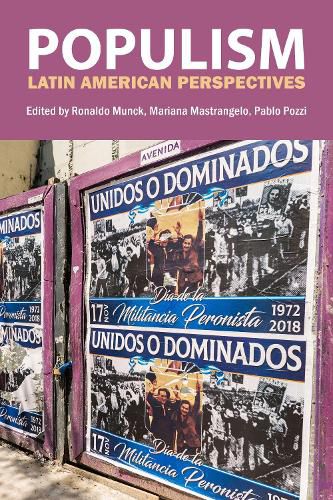Readings Newsletter
Become a Readings Member to make your shopping experience even easier.
Sign in or sign up for free!
You’re not far away from qualifying for FREE standard shipping within Australia
You’ve qualified for FREE standard shipping within Australia
The cart is loading…






Populism has become one of the most overused terms in political discourse today. It can embrace authoritarian and nativist right-wing politicians but also those on the left who appeal for popular support for transformation. In its dominant usage it is seen as inimical to the values of liberal democracy. Yet others see it as part of the construction of a people-centered project that can realize true democracy. What is clear is that much of the debate around populism has been from the perspective of the global North and the voice of the South has been largely missing.
This volume contributes to the global debate on populism from a Latin American perspective. International debates have tended to simplify the Latin American experience, positing Peronism as a form of fascism and the left governments after 2000 as populist because they broke with austerity politics. It argues that Latin America in its rich and early experience of populism is a valuable laboratory to take our understanding forward and to address the question of whether populism now goes beyond the dichotomy of left and right and is a new political phenomenon.
The book presents a series of case studies with cross-cutting overview chapters that highlight the lessons to be learned from new research. Each chapter is set within a tight conceptual framework in order to better understand contemporary Latin American politics after the pink tide and to enrich the international debate on populism from a Latin American perspective.
$9.00 standard shipping within Australia
FREE standard shipping within Australia for orders over $100.00
Express & International shipping calculated at checkout
Stock availability can be subject to change without notice. We recommend calling the shop or contacting our online team to check availability of low stock items. Please see our Shopping Online page for more details.
Populism has become one of the most overused terms in political discourse today. It can embrace authoritarian and nativist right-wing politicians but also those on the left who appeal for popular support for transformation. In its dominant usage it is seen as inimical to the values of liberal democracy. Yet others see it as part of the construction of a people-centered project that can realize true democracy. What is clear is that much of the debate around populism has been from the perspective of the global North and the voice of the South has been largely missing.
This volume contributes to the global debate on populism from a Latin American perspective. International debates have tended to simplify the Latin American experience, positing Peronism as a form of fascism and the left governments after 2000 as populist because they broke with austerity politics. It argues that Latin America in its rich and early experience of populism is a valuable laboratory to take our understanding forward and to address the question of whether populism now goes beyond the dichotomy of left and right and is a new political phenomenon.
The book presents a series of case studies with cross-cutting overview chapters that highlight the lessons to be learned from new research. Each chapter is set within a tight conceptual framework in order to better understand contemporary Latin American politics after the pink tide and to enrich the international debate on populism from a Latin American perspective.